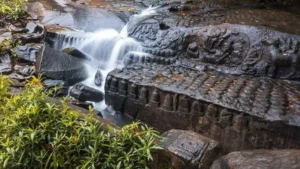India is home to many beautiful wildlife sanctuaries that protect rare animals and birds. These sanctuaries are important for saving nature and giving animals a safe place to live. One such sanctuary is known for its green hills, peaceful surroundings and rich wildlife. It is also the natural home of a special and colorful bird called the Grey-bellied Tragopan, which is rarely found in other places.
Location of Pulie Badze Wildlife Sanctuary
Pulie Badze Wildlife Sanctuary is situated near Kohima, the capital of Nagaland. It lies around the Pulie Badze mountain, which is 2,296 meters (7,533 feet) tall. The name ”Pulie Badze” means ”Pulie’s Seat” and comes from a local folktale about a legendary man named Pulie.
Why is it Special?
The sanctuary is famous for its beautiful views and calm environment. From the top of the Pulie Badze mountain, visitors can enjoy scenic sights of Kohima town and even parts of the nearby state of Manipur. It is a peaceful place for nature lovers and trekkers.
Rich Birdlife of Pulie Badze Wildlife Sanctuary
Pulie Badze is home to many rare and colorful birds. Some of the special birds found here include:
- Tragopan Blythii ( a type of pheasant)
- White-naped Yuhina
- Dark-rumped Swift
Bird watchers and researchers love visiting this place because of its bird diversity.
Activities for Visitors
The sanctuary is open to tourists and has many simple and fun activities:
- Walking trails through the forest
- Campsites for overnight stays
- Guided nature walks to learn about the local plants and animals
It is a great place for school trips, family outings or quiet solo visits.



 Weekly One Liners 26th January to 01st o...
Weekly One Liners 26th January to 01st o...
 Which River is known as the River of Tho...
Which River is known as the River of Tho...
 Which Country is known as the Land of Su...
Which Country is known as the Land of Su...








